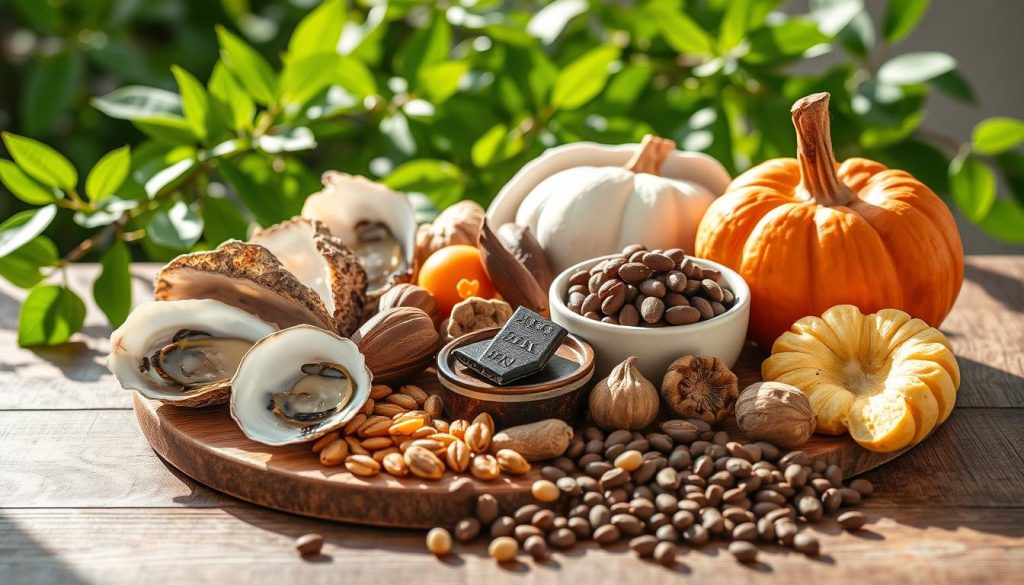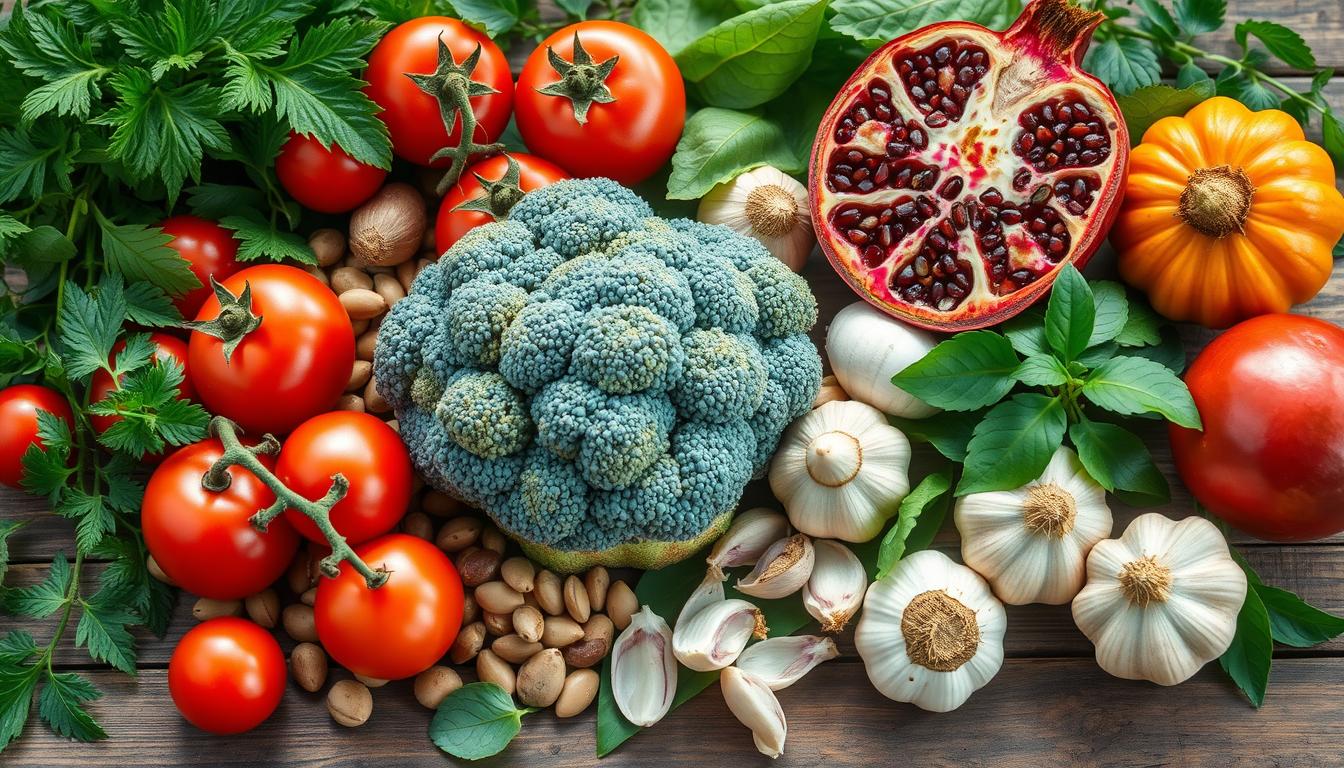We’re exploring how to keep men’s health strong, focusing on the prostate. It’s key because of the high number of prostate cancer cases. Eating foods rich in natural ingredients is a big part of staying healthy.
Our guide shows you the best foods for prostate health. Think tomatoes, berries, and veggies like broccoli. These foods help your health in many ways.
We also talk about green tea, fatty fish, and nuts. Foods like garlic and turmeric are good for your prostate too. They might even help prevent other health problems.
Understanding Prostate Health and Its Importance
The prostate gland is key in the male body. It’s located below the bladder. As men get older, it can cause health problems like benign prostatic hyperplasia and prostate cancer.
What is Prostate Health?
Prostate health means the prostate gland works well. It helps with making and moving seminal fluid, which is important for fertility. As men get older, the prostate can change, leading to issues like benign prostatic hyperplasia and prostate cancer.
Common Prostate Issues
Prostate problems include benign enlargements and infections. Benign prostatic hyperplasia, or BPH, is common in older men. It causes frequent urination, especially at night.
Prostate cancer is another big worry. It might not show symptoms early but can be serious if not caught soon. Age, family history, and lifestyle affect your risk. African American men and those with a family history are at higher risk.
The Role of Lifestyle in Prostate Health
What you do every day affects your prostate health. Eating right, staying active, and not smoking can help. Regular check-ups and tests, like the PSA test, are also important. They help find problems early, like prostate cancer and benign prostatic hyperplasia.
Knowing about prostate health and common problems is key for older men. By focusing on prevention and early treatment, we can improve health for those with prostate issues.
Key Nutrients for Prostate Support
We stress the need for certain nutrients for prostate health. They help prevent common prostate problems. They also support overall health, especially for men over 40.
Vitamins and Minerals Essential for Prostate Health
Vitamins and minerals are key for prostate health. Vitamin E and selenium are good in small amounts. But too much can be harmful, as studies have shown.
Eating foods naturally rich in these nutrients is best. A diet full of fruits, veggies, and lean proteins helps keep levels right.
Antioxidants and Their Benefits
Antioxidants fight oxidative stress and inflammation. These are linked to prostate health issues. Lycopene in tomatoes, watermelon, and grapefruit is especially good for the prostate.
Drinking green tea and hibiscus tea also helps. Studies show they’re good for prostate health.
Eating a variety of colorful veggies and fruits is key. Berries and cruciferous veggies are great. They help the prostate and the body as a whole.
We suggest adding these nutrients to your meals. Eat in moderation and vary your diet. This is a good way to keep your prostate healthy and your body well.
Saw Palmetto: A Natural Ally for Prostate Health
Saw Palmetto is a great natural remedy for prostate health. It’s known for its benefits in supporting the prostate. It comes from the Serenoa repens tree and has been studied a lot.
How Saw Palmetto Works
Saw Palmetto works by blocking an enzyme called 5-alpha-reductase. This is important because it stops testosterone from turning into DHT. DHT is a hormone that can make the prostate bigger.
It also has anti-inflammatory properties. These help with symptoms like needing to pee a lot and waking up to pee at night.
Research Supporting Saw Palmetto
Many studies show Saw Palmetto is good for the prostate. A product called Permixon has shown great results. It helps with symptoms of BPH, like trouble peeing.
| Study | Number of Participants | Result |
|---|---|---|
| Permixon’s effect on DHT levels | 33 patients with BPH | 50% reduction in prostate DHT levels |
| Permixon compared to finasteride | 1,098 patients | Equivalent in treating BPH symptoms with fewer sexual side effects |
| Meta-analysis on Permixon | N/A – Review of multiple studies | Improved symptoms and urine flow rate compared to placebo |
Even though it’s helpful, results can differ. Some studies show little benefit. Always talk to a doctor before taking Saw Palmetto.
In short, Saw Palmetto is a good natural choice for prostate health. It has a long history of use and scientific support. It’s worth considering for your health.
The Benefits of Zinc for Prostate Wellness
Zinc is key for keeping the prostate healthy as men get older. It helps lower the risk of prostate problems. We’ll see why zinc is important in prostate health supplements.
Zinc Sources and Recommended Intake
Eating foods high in zinc is important for prostate health. Good sources are beef, chicken, fish, nuts, and seeds. Oysters have the most zinc, making them great for zinc intake.
The daily zinc need for men is 15 milligrams. It helps the prostate, immune system, and healing. If you can’t get enough from food, zinc supplements can help.
Link Between Zinc and Prostate Health
Research shows zinc helps lower prostate problem risks. Prostate cells have lots of zinc, showing its role in prostate function. Zinc levels are lower in cancerous prostate glands.
Zinc supplements over 15 mg a day can cut advanced prostate cancer risk by 66%. Higher zinc in prostate tissue means lower cancer risk. Zinc also helps with BPH symptoms by blocking harmful androgens.

In summary, enough zinc is vital for prostate health, especially for men over 50. Eating right and possibly taking supplements can help keep the prostate healthy and prevent diseases.
Pumpkin Seed Oil: Nature’s Secret Weapon
Pumpkin seed oil is a powerful ally against health issues like benign prostatic hyperplasia. It’s full of nutrients that help the prostate and overall health.
Nutritional Profile of Pumpkin Seed Oil
Pumpkin seed oil is packed with phytoestrogens. These help lower health risks linked to too much estrogen. It also has good fats that help control blood sugar, blood pressure, and cholesterol.
Evidence Supporting Its Benefits
Studies show pumpkin seed oil helps with benign prostatic hyperplasia. It makes the prostate smaller, a better choice than some medicines. It also helps with hair loss by blocking DHT.
Using pumpkin seed oil often means fewer trips to the bathroom at night. It helps an overactive bladder, leading to better sleep. It’s also good for your heart and liver.
| Health Aspect | Benefit of Pumpkin Seed Oil |
|---|---|
| Prostate Health | Reduces prostate size, aids in benign prostatic hyperplasia management |
| Hair Health | Prevents hair loss, surpasses effectiveness of minoxidil |
| Menopausal Support | Reduces frequency of hot flashes, supports hormonal balance |
| Cardiovascular Health | Reduces risk of stroke, heart disease |
| Bladder Control | Alleviates symptoms of overactive bladder |
The Role of Omega-3 Fatty Acids
Omega-3 fatty acids play a big role in prostate health. They are found in fatty fish, walnuts, and flaxseeds. These fats are good for the heart and may help with prostate inflammation.
Sources of Omega-3s
Omega-3 fatty acids are important fats we get from food. The best sources are:
- Fatty fish like salmon, mackerel, and sardines
- Plant oils such as flaxseed oil, soybean oil, and canola oil
- Nuts and seeds, particularly walnuts and flaxseeds
- Fortified foods, including certain brands of eggs, yogurt, and juices
How Omega-3s Support Prostate Function
Studies show omega-3s help reduce inflammation in the prostate. This is good for health. Eating foods rich in omega-3s can lower inflammation and improve prostate function.
Research also suggests omega-3s can make cells work better. This might help prevent prostate problems.
In short, knowing how omega-3s affect prostate health is key. Adding these fats to your diet is a smart move for better health. As research grows, eating omega-3s will keep supporting prostate health and more.
Lycopene: A Powerful Antioxidant
Lycopene is key for keeping the prostate healthy. It’s a strong antioxidant that fights off bad stuff in our bodies. This helps prevent cancer, including prostate cancer.
Foods Rich in Lycopene
Where can you find lycopene? It’s in tomato products like ketchup and pasta sauce. But eating fresh tomatoes, watermelons, pink grapefruits, and papayas also helps.
Research on Lycopene and Prostate Health
Studies show lycopene is good for us. A 2020 review found 93% of trials showed it helped fight cancer. Eating lycopene can lower the risk of prostate and other cancers.
| Statistics | Details |
|---|---|
| Prostate Cancer Prevalence | Second most diagnosed cancer among men globally |
| Lycopene’s Regulatory Status | Recognized as Safe (GRAS) by US FDA |
| Complementary Therapies | Approximately 25% of prostate cancer patients rely on antioxidants like lycopene |
Lycopene is great because it can soak up oxygen. It’s better than other carotenoids because of its special structure. The 5-cis lycopene is the most powerful antioxidant.
Adding lycopene to your diet is good. But remember, it works best with other healthy foods. This mix is the best way to stay healthy and fight off diseases.
The Impact of Green Tea on Prostate Health
Green tea is good for the prostate. It has special helpers called catechins. These help keep the prostate healthy.
Compounds in Green Tea that Benefit Prostate Health
Green tea has a lot of catechins. One called EGCG is very important. It helps the prostate stay healthy.
EGCG fights off bad stuff that can harm the prostate. This is good news for those worried about prostate cancer.

Studies and Findings
Studies show green tea is great for the prostate. It can even help prevent prostate cancer. Here are some important findings:
| Study Type | Location | Green Tea Consumption | Findings |
|---|---|---|---|
| Case-Control Study | China | 3+ cups daily, or over 40 years | Reduced risk of prostate cancer (Odds ratio: 0.12 – 0.28) |
| Cohort Study | Japan | 5+ cups daily | Dose-dependent inverse relationship with advanced prostate cancer risk |
| Prospective Cohort Study | Hawaii | Regular consumption with oriental diet | Decreased, though not statistically significant, risk of prostate cancer |
Green tea is full of catechins. Drinking it every day might help your prostate. It’s a smart choice for a healthy prostate.
Incorporating Turmeric: Powerhouse for Wellness
Turmeric is great for health, especially for prostate health support. It has lots of curcumin. This helps fight inflammation and may stop prostate cancer cells from growing.
Curcumin’s Role in Inflammation Reduction
Curcumin in turmeric fights inflammation well. This is good for many health issues, like arthritis. It also helps the prostate stay healthy by fighting inflammation.
Studies show turmeric can help prevent heart problems. It lowers the risk of heart attacks after surgery.
Best Ways to Consume Turmeric
To get the most from turmeric, add it to your food or take it as a supplement. This gives you lots of curcumin. Here are some ideas:
- Blend turmeric into your smoothies or juices for a healthful kick.
- Add it to your cooking, like curries, to enjoy not only its health benefits but also its distinctive flavor.
- Consider supplements, especially if your dietary intake of turic may be limited. These are often more potent and provide a substantial amount of curcumin.
To get turmeric to work best, eat it with healthy fats like oils or avocados. Also, add black pepper. It has piperine, which makes curcumin work better by up to 2,000%.
We suggest adding turmeric to your diet often. It’s good for prostate health support and overall health. Always talk to a doctor before taking supplements.
The Importance of a Balanced Diet for Prostate Health
Keeping your prostate healthy is key for men, especially as they get older. Eating a balanced diet helps prevent prostate problems and keeps you well. Studies show that eating certain foods and avoiding others can help your prostate stay healthy.
Foods to Include
Eating foods full of nutrients is good for your prostate. Here’s what you should eat:
- Fruits and vegetables: Aim for at least five a day.
- Whole grains, beans, and legumes are good for fiber. They help lower hormones that might cause prostate cancer.
- Cruciferous veggies like broccoli, cauliflower, and Brussels sprouts. Eating three or more servings a week can cut prostate cancer risk by 41%.
- Omega-3s from fish, flaxseeds, and walnuts help cells stay strong and lower cancer risk.
- Tomatoes, soy, and nuts are full of antioxidants and phytoestrogens. Eating a lot of these can lower prostate cancer risk by 20%.
Foods to Avoid
Some foods can harm your prostate health. Avoiding these can help prevent prostate problems:
- Red and processed meats: Eat no more than 700-750 grams a week to avoid too much fat.
- High-fat dairy and other high-saturated fat foods can make prostate cancer grow.
- Stay away from trans fats in hydrogenated fats and fried foods to lower cancer risk.
- Don’t eat too many calories. Eating more can increase cancer risk.
- Drink no more than 14 units of alcohol a week. Also, limit sugary drinks like fruit juices and smoothies to 150 ml a day.
| Food Category | Recommended Intake | Benefit to Prostate Health |
|---|---|---|
| Fruits and Vegetables | At least 5 portions/day | Rich in fiber, antioxidants, reduces cancer risk |
| Cruciferous Vegetables | 3+ servings/week | Decreases prostate cancer risk by 41% |
| Omega-3 Sources | Regular intake | Reduces cancer risk, supports cell integrity |
| High-fat Foods | Limited intake | Reduces risk of cancer growth |
Eating a balanced diet is key for prostate health. It’s not just about avoiding bad foods. It’s also about eating good foods that help your prostate stay healthy. Making smart food choices can help men stay healthy and lower prostate risks.
Lifestyle Changes for Optimal Prostate Health
Changing your lifestyle is key to keeping your prostate healthy. Exercise and stress management are very important. They help a lot with exercise benefits and stress management, which are good for your prostate health.
Exercise and Its Benefits
Exercise is great for your health, and it’s especially good for your prostate. It can lower your risk of prostate cancer and boost your immune system. It also helps reduce inflammation. Here are some tips:
- Exercise can lower your risk of prostate cancer and help you stay at a healthy weight. Being overweight can increase your risk of aggressive prostate cancer.
- Being active can help with symptoms of benign prostatic hyperplasia (BPH). It makes the muscles around your prostate stronger.
- Try to do at least 150 minutes of moderate exercise each week. This will help you get the most benefits.
Stress Management Techniques
Managing stress is very important for your prostate health. Too much stress can make your symptoms worse. Using stress-reducing techniques can improve your health and help with symptoms of prostatitis and BPH.
- Mindfulness, meditation, and yoga can help reduce stress. They also improve your sleep and reduce anxiety.
- Try to drink less caffeine and alcohol. They can irritate your prostate and make stress worse.
Here’s a simple guideline table for fluids and diet management beneficial for prostate health:
| Type of Fluid/Diet | Recommended Intake | Benefits |
|---|---|---|
| Fluids | Approximately 2 liters per day | Helps manage BPH symptoms |
| Alcohol | Not more than 14 units per week | Reduces risk of aggressive prostate cancer |
| Antioxidants (Lycopene) | Frequent intake through foods like cooked tomatoes | May slow prostate cancer cell growth |
| Omega-3 Fatty Acids | Regular intake via diet | Reduces inflammation and risk of prostate cancer |
By making these lifestyle changes, you can improve your prostate health and overall well-being. Start these habits today for a healthier future.
When to Seek Professional Guidance
Keeping your prostate healthy is very important. But, it’s also key to watch for signs of trouble. If you notice problems like hard starting to pee or needing to pee a lot at night, get help fast. These signs might mean you have a serious health issue.
Signs of Prostate Issues to Watch For
Men should know the signs that mean they need to see a doctor right away. Feeling something odd in your prostate or having a high PSA level are big warnings. If your family has had prostate cancer, you might need to get tested or see a genetics expert.
Knowing these signs early can help you get better faster. UK rules say you should see a specialist within 2 weeks if you have worrying symptoms.
Consultation Tips for Your Healthcare Provider
When you talk to your doctor, be ready. Tell them about your health and your family’s health. It’s also important to talk about your lifestyle and how it affects your prostate.
Guidelines say genetic tests are important, especially if you have certain genes. With new information from Public Health England, staying informed is crucial for your health.


